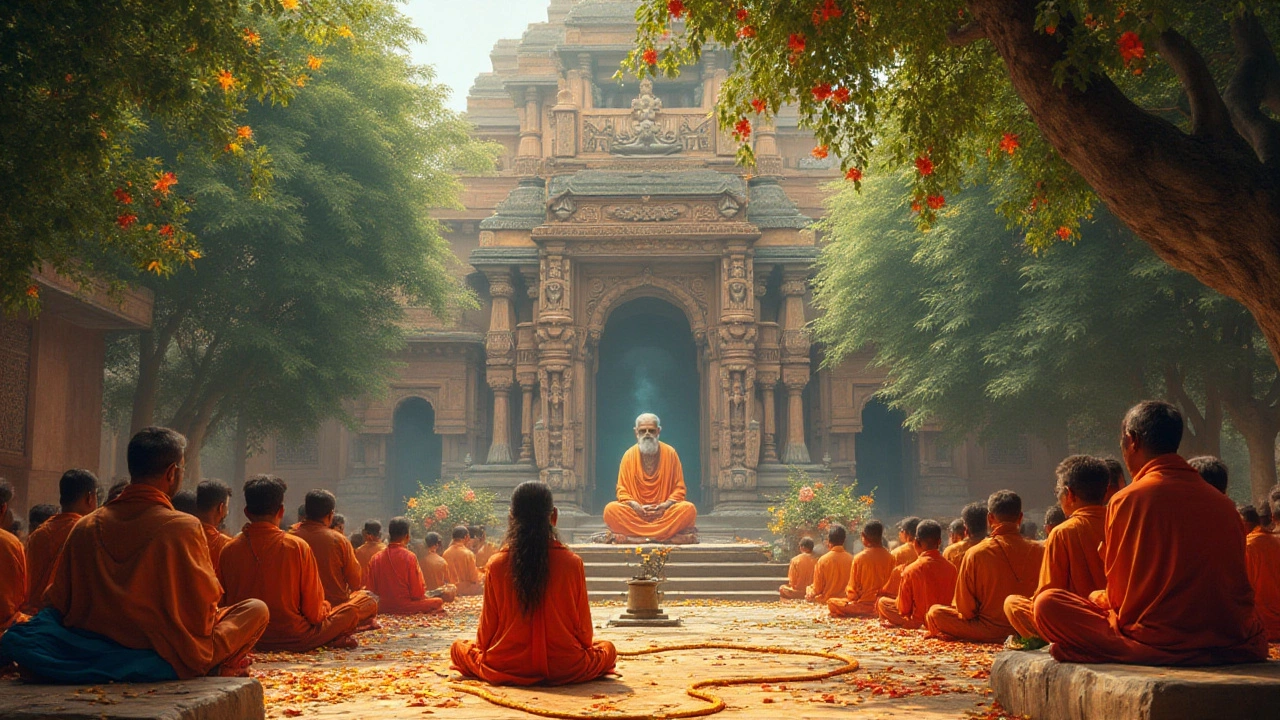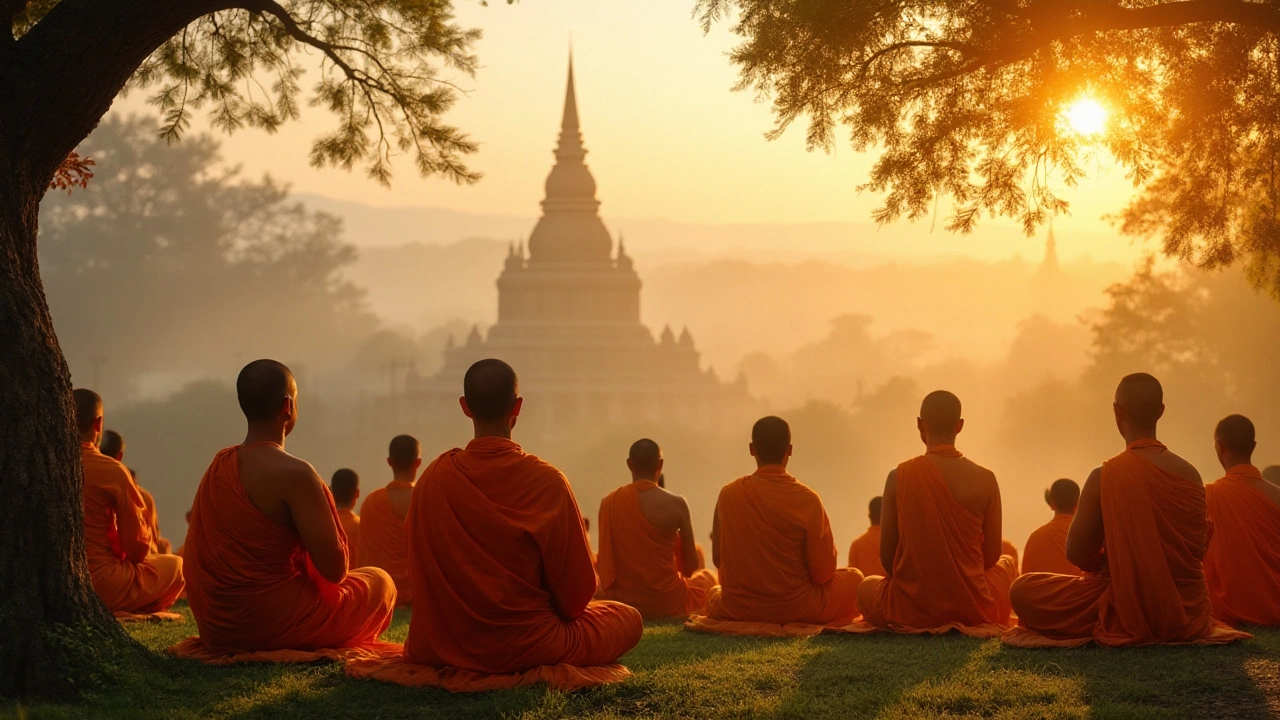Spiritual Beliefs in India: A Deep Dive into Diverse Traditions

India's spiritual landscape is as varied and complex as its cultural mosaic. With a history dating back thousands of years, it invites countless explorers into its realm of faith and philosophy. The spiritual beliefs here are not confined to a single narrative; instead, they represent a kaleidoscope of ideas and traditions that have evolved over centuries, each contributing to a shared understanding of the universe and our place within it.
The core tenets of India's spiritual beliefs emphasize concepts such as karma—the moral law of cause and effect—and dharma, one's duty and righteous path. These ideas bind together diverse religious philosophies, including Hinduism, Buddhism, and Jainism, which, while originating from the same soil, offer unique interpretations and practices.
Understanding Indian spirituality demands more than just a look at its scriptures; it requires a look into the everyday lives of its adherents, where traditions are diligently followed and adapted. In today's world, many Indian spiritual practices continue to thrive, adapting to modern contexts while remaining rooted in age-old teachings.
- Introduction to Indian Spirituality
- Diverse Religious Traditions
- Core Principles: Karma and Dharma
- Influence on Culture and Daily Life
- Modern Spiritual Practices in India
Introduction to Indian Spirituality
Delving into the heart of Indian spirituality is like embarking on a timeless journey through a labyrinth of beliefs and disciplines that have shaped the consciousness of millions. The spiritual fabric of India is woven with threads of ancient wisdom and contemporary practices, making it a haven for seekers worldwide. Spirituality in India is not confined merely to rites and rituals; it encompasses a broader perspective that seeks harmony with the cosmos. This pursuit of understanding the self and the universe is deeply embedded in the culture and psyche of the nation. India, often revered as the land of spirituality, boasts an array of diverse traditions, each contributing to an intricate tapestry of beliefs. From the ancient texts of the Vedas to modern spiritual leaders inspiring global audiences, Indian spirituality offers a vast reservoir of knowledge and insight. In the words of Mahatma Gandhi, "The essence of Hinduism or Brahmanism is one and the same; there is no sense of distinction between mind and soul, the whole universe is interconnected." Such philosophies continue to resonate, transcending the boundaries of time and space.
Hinduism, known as Sanatana Dharma, represents the oldest religious traditions in the world, capturing the essence of Indian spirituality with its numerous deities, doctrines, and paths to enlightenment. Yet, it is not a single, monolithic belief system; rather, it is a wide spectrum of ideas and practices aimed at achieving peace and enlightenment. The foundational elements of Hindu philosophy pivot on the principles of karma and dharma, guiding individuals to live a life aligned with universal laws and moral duties. Parallelly, other profound faiths such as Buddhism and Jainism, born on Indian soil, enrich this spiritual landscape. Buddhism's four noble truths and the Jain emphasis on non-violence and asceticism further sculpt the diverse contours of Indian spiritual identity. Each tradition invites followers and inquisitors alike to embark on an internal quest; a journey seeking answers to life's ultimate questions.
The interplay of faith and life is visible in the everyday rituals, festivals, and an inherent sense of discipline practiced by many in India. Spirituality here is not an isolated pursuit but a way of life, offering peace and a sense of purpose amidst the chaos of modern existence. It is manifested in countless ways - through the ringing of temple bells, chanting of prayers at dawn, meditation in tranquil ashrams, or the vibrant celebrations of Diwali and Holi. Even in urban centers bustling with change, spiritual practices continue to thrive, adapting and evolving with contemporary challenges while remaining steadfast in their core teachings. Many scholars and practitioners around the globe have acknowledged the profound impact of Indian spiritual traditions on shaping a holistic world-view. Whether one seeks liberation from the cycle of birth and death or simply longs for tranquility within, the ancient spiritual ethos of India has something to offer to each soul crossing its threshold.
Diverse Religious Traditions
India is a spiritual haven where myriad religious traditions converge, each offering its own unique perspective on the mysteries of existence. Predominantly, Hinduism—recognized as the world's oldest organized religion—dominates the spiritual landscape, yet it's only the beginning of a spectacular mosaic of beliefs. Hinduism, rather than being a single faith, is an umbrella of practices and philosophies that embrace a multitude of gods and pathways to the divine. Its flexibility has allowed it to absorb and reflect the changing cultures and ideas throughout the centuries. A practitioner of Hinduism might worship Shiva, the god of transformation, or Vishnu, the preserver of life, with equal reverence, embracing the core ethos of spiritual growth and understanding while following the principle of karma where one's actions predestine their future.
These beliefs interweave seamlessly with Buddhism, which blossomed in India around the 6th century BCE. Founded by Siddhartha Gautama, later known as Buddha, Buddhism introduces a path of moderation and introspective quest for enlightenment. Central to its teachings are the Four Noble Truths and the Eightfold Path, which guide adherents towards liberation from suffering and the cycle of rebirth. Buddhist monasteries and stupas dotted across India stand as testament to the profound influence of its doctrines. A quote from the esteemed Dalai Lama perfectly encapsulates this spiritual journey:
“The purpose of our lives is to be happy.”With its core belief that spiritual development comes from personal experience and wisdom, it highlights a form of spirituality based on self-discovery and inner harmony.
Parallel to Buddhism's rise was the emergence of Jainism, another ancient religious tradition that calls for strict adherence to non-violence and truthfulness. Established by Vardhamana Mahavira in the 5th century BCE, Jainism stands unique with its rigorous path towards liberation, emphasizing austerity and a disciplined way of life. It propounds the fundamental tenet of Ahimsa—non-violence, not just in action, but in thought and word. Jains are known for their ascetic practices and deep environmental consciousness, considering nature and its creatures as integral components of the cosmic web.
The spiritual fabric of India would be incomplete without acknowledging Sikhism, a relatively newer religion founded in the 15th century by Guru Nanak in the Punjab region. Emphasizing equality, community service, and devotion to one God, Sikhism marries the mystical elements of both Hinduism and Islam. The sacred scripture of Sikhs, Guru Granth Sahib, is not just a holy book but a living guide that blends spiritual teachings with worldly wisdom. The Golden Temple in Amritsar, an epicenter of Sikh spirituality, showcases the tenets of hospitality and universal brotherhood embedded in its values.
These traditions not only offer various paths to spiritual enrichment but also shape the Indian spirituality landscape in profound ways. Festivals like Diwali, celebrating the triumph of light over darkness, and Holi, the festival of colors, bring together communities regardless of religious affiliations, symbolizing unity in diversity. Whether observing a ritual in a grand temple, meditating in a quiet sanctuary, or simply engaging in acts of kindness, the spiritual beliefs of India resonate with a timeless wisdom that transcends borders, inviting everyone to participate in its divine dance.

Core Principles: Karma and Dharma
The heart of Indian spirituality often revolves around two pivotal concepts: karma and dharma. These principles serve as both philosophical and practical guidelines for millions, providing a framework for ethical living. Karma, a term that has permeated global consciousness, refers to the intricate web of cause and effect. It implies that every action has consequences, shaping not only this life but also future existences. This belief underscores the value of moral accountability, encouraging individuals to undertake righteous deeds. Unlike simple punishment or reward systems, karma is considered a cosmic balance, a reflective dance of actions across time.
Dharma, on the other hand, encapsulates the concept of duty or righteousness within the context of societal roles and personal evolution. Each person has their own dharma, influenced by factors such as age, caste, gender, and stage in life. This principle inspires adherence to one's personal duties while contributing positively to the community. Remarkably, it offers profound flexibility, urging each individual to interpret their duties in light of the present moment's demands. For example, a father’s dharma might differ from that of a monk, each finding integrity in their respective paths.
The Symbiosis of Karma and Dharma
While karma emphasizes consequence, dharma focuses on the inherent rightness of actions, often interwoven in practice. When one's dharma aligns with moral choices, karma naturally supports the soul's growth. Spiritual texts like the Bhagavad Gita elaborate on these points, portraying conversations where achieving spiritual enlightenment is about perfecting an understanding of one's own duties. This synergy between karma and dharma can guide individuals towards self-awareness, prompting them to reflect on their actions and intentions intimately.
"In the practice of Dharma lies the seed of success; in the understanding of Karma lies the root of harmony." — Ancient Indian Proverb
Significantly, these principles don't just capture abstract philosophies but deeply impact the lives and cultures of Indian communities. The presence of utsav (celebrations) and yajnas (sacrificial rituals) underscore the collective effort to align with these spiritual insights, reminding adherents of the shared journey of life. Karma and dharma are not merely about personal development; they are expansive ideas that advocate for harmony with one's environment and society.
Influence on Culture and Daily Life
When we look at the fabric of Indian life, we discover just how deeply spirituality is woven into daily routines, festivals, and even personal relationships. From the moment the sun rises, many Indians begin their day with prayer and meditation, practices meant to center one's mind and offer gratitude. These rituals are not reserved for moments of crisis or special events; they are, for numerous people, as essential as any other daily habit. The practice of yoga, which has gained immense global popularity, traces its origins to ancient India and is often practiced alongside these rituals. Its frequent mention in texts shows how physical wellness is seen as closely linked to spiritual well-being.
Festivals in India showcase the vibrant and profound connection between spirituality and culture. Whether it's Diwali, known as the festival of lights celebrated by Hindus, or Eid, marking a time of renewal for Muslims, each festival is steeped in traditions that commemorate spiritual events and invite communal participation. For instance, during Diwali, homes are illuminated with lamps symbolizing the victory of light over darkness and knowledge over ignorance. The cultural significance of these festivals often transcends religious affiliations, bringing people together in shared celebrations of life. Indian spirituality encourages not just individual growth but communal harmony, which is reflected in these gatherings.
The influence of spiritual beliefs also extends to dietary habits. Many Indians follow a vegetarian diet, an aspect influenced by religions like Hinduism, Buddhism, and Jainism, which encourage non-violence and respect for all living beings. This concept of ahimsa, or non-violence, emphasizes kindness and compassion towards every creature, shaping dietary choices and promoting sustainability. For instance, Jain monks practice extreme forms of this belief, sweeping the ground before them to avoid harming even the smallest insects.
Another facet where spirituality in India plays a pivotal role is in its artistic expressions, from classical dance forms like Bharatanatyam and Kathak, to intricate temple carvings and paintings. These art forms are not merely for entertainment but serve as mediums to express devotion and tell stories of ancient deities and philosophical teachings. This spiritual link is evident in the way performances are often preceded by prayer or ritual, underscoring the sacred nature of the art.
Elders in many Indian families hold a revered status, offering guidance rooted in ancestral wisdom and spiritual teachings. This respect for the older generation underscores the importance placed on tradition and continuity. It's not unusual for moral and ethical dilemmas to be discussed within the family, reflecting the spiritual teachings of karma and dharma, influencing decisions in both personal and professional spheres.
The exceptions to this pervasive spiritual influence are as telling as the norms. Urbanization and modernization have introduced new challenges and perspectives, sometimes leading to a more secular lifestyle, especially among the youth. Yet, even within bustling city life, one can see many young people attending yoga classes, celebrating traditional festivals, or engaging in discussions about spirituality, showing the enduring influence of these ancient beliefs. A recent survey suggested that a significant percentage of urban Indians participate in at least one traditional festival annually, bridging their contemporary lives with rich heritage.
"Spirituality is the essence of Indian culture. It is what gives India its identity." — Sadhguru
In this light, it's clear that Indian spirituality remains a cornerstone of cultural identity, shaping the lives of millions and offering a unique lens through which to navigate both the mundane and the extraordinary aspects of existence. The teachings of old continue to resonate, providing a sense of peace and purpose that transcends the fast pace of modern living.

Modern Spiritual Practices in India
In the modern era, spirituality in India has adapted in fascinating ways, bridging ancient traditions with contemporary practices. Amidst the hustle and bustle of today's world, a growing number of people are turning to spirituality for solace and guidance, making concepts like karma and dharma more relevant than ever before. This renewed interest has given rise to new forms of expression and understanding, while honoring the time-tested beliefs deeply rooted in Indian culture. Meditation and yoga, with their origins stretching back thousands of years, have seen a remarkable resurgence. These practices are not limited to physical poses or breath control; they extend into mindfulness and self-awareness—essences of true spiritual well-being.
The urban centers of India are now dotted with yoga studios, meditation centers, and retreats that cater to seekers from all walks of life. Many of these places offer a fusion of old and new, where traditional practices such as Vedic chanting are complemented by modern techniques like guided visualization. These venues serve as sanctuaries for individuals looking to reconnect with their inner selves amidst the chaos of city life. Digital platforms have also played a significant role in this spiritual renaissance. Online classes, apps, and virtual discussions make spiritual guidance more accessible, connecting people irrespective of geographical boundaries.
"Yoga is the journey of the self, through the self, to the self," says the Bhagavad Gita, underscoring the timeless pursuit of self-realization.
Another significant trend is the incorporation of spirituality into wellness tourism. Travelers from across the globe flock to India, not just for its heritage sites, but also for spiritual detox and rejuvenation. Kerala's Ayurvedic resorts, the ashrams of Rishikesh, and the tranquil beaches of Pondicherry offer holistic healing experiences rooted in ancient practices. Such destinations provide a holistic package, combining nutrition, meditation, and spiritual learning in serene environments.
A growing interest in holistic healing has also brought attention to traditional Indian medicinal practices. Ayurveda, the ancient science of life, is increasingly being embraced not just as a treatment for ailments but as a way of life that aligns with one's spiritual journey. Its philosophy of balance and harmony between the mind, body, and spirit resonates with core Indian spirituality beliefs. Modern practitioners serve as bridges, translating these age-old principles into practices applicable in today's fast-paced society.
While modernization and technological advancements might seem at odds with spiritual growth, they actually complement each other in modern India. Technology facilitates growth by making spiritual resources available to a broader audience. Interactive apps, virtual courses, and e-books about Indian spirituality practices contribute to the ongoing dialogue between the ancient and the modern. This harmonious fusion keeps the spiritual flames alive in a world that is continuously evolving, grounding people even as they move towards a future that promises even more rapid changes.